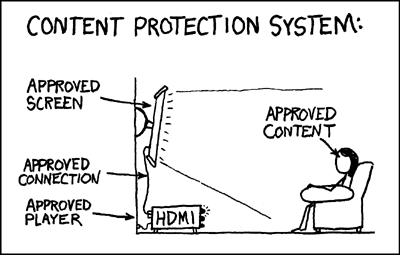129: Content Protection
Explanation[edit]
This comic is a commentary on HDCP, a media standard that requires all the devices from player to cable to display to be "approved" to carry HDCP content. HDCP is intended to protect media encrypted with DRM from being intercepted between the player and the display. Interestingly, however, it is literally impossible for DRM advocates to completely prevent copying (even with such drastic measures) because of the analog hole: since the content must be shown in a human-perceptible form, it can be captured by analog means, such as recording the display with a video camera.
In addition to illustrating the absurdity of HDCP, the comic presents the darker idea that when your devices control what information you are exposed to, the controlling companies can act as "thought police" and ensure that your mind only contains "approved content."
With the title text, Randall is referring again to DRM. The Free Culture movement (Lawrence Lessig being one of their activists) is fighting for free content. DRM advocates claim that their technology "protects" artists by preventing piracy, while in reality, DRM is more effective as a means of giving media companies control over devices than it is at preventing piracy.
Chapters 13 and 14 of the Free Culture book by Lawrence Lessig concern Eldred v. Ashcroft, 537 U.S. 186 (2003), a decision by the Supreme Court of the United States upholding the constitutionality of the 1998 Sonny Bono Copyright Term Extension Act (CTEA). The practical result of this was to prevent a number of works from entering the public domain in 1998 and following years, as would have occurred under the Copyright Act of 1976. Lessig was a lead council in this case. In his opinion he lost the case because his arguments were about culture instead of the economy. The structure of current law makes it exceedingly difficult for someone who might want to do something with an old work to find the copyright owner, because no central list exists. Because these old works no longer seem commercially viable to the copyright holder, many are deteriorating.
In chapter 14 Lessig uses the disproportionate number of HIV and AIDS victims in Africa and other poor countries to further his argument that the current control of intellectual property—in this case, patents to HIV drugs—defy "common sense."
Transcript[edit]
- Content Protection System:
- [Megan sits on a couch watching a large flat-panel television, connected to a box labeled HDMI.
- The screen is labeled with "Approved screen"
- The cable is labeled with "Approved connection"
- The HDMI box is labeled with "Approved player"
- Megan's head is labeled with "Approved content"]
Discussion
Lessig, mentioned in the title text, announced his candidacy for the 2016 US presidency on September 6, 2015. Mountain Hikes (talk) 00:00, 13 September 2015 (UTC)
I think that the minimal comments on some of the smartest comics here says a lot about even the readers of XKCD. —Kazvorpal (talk) 01:49, 21 September 2019 (UTC)
Comments say a lot about the people that make them.
There are no comments because no one disagrees. Everyone knows the comic is right about bashing DRM. JackGreenEarth (talk) 12:48, 17 September 2023 (UTC)JackGreenEarth
_____
Sound like Randall needs to read this again. 23:26, 14 October 2020 (UTC)

